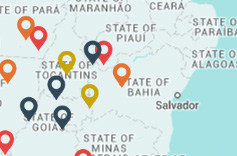Caboclo Tupy Umbanda Center
Preserving the Axé: popular legal assistance against the elimination of Afro-religious spaces in Sergipe
Sergipe
Objetivos e público prioritário
Creating a permanent network of legal professionals and afro-religious activists trained to protect and safeguard sacred religious spaces related to African religions in Sergipe.
Main activities
– Training workshops for the team.
– Seminar to present final projects from team training workshops.
– Legal assistance and creation of petitions to public organs.
– Accompaniment of administrative and judicial cases and measures.
– Seminar to present the project’s final results.
Context
The unorganized process of urbanization contributes to the loss of Afro-religious territory in Sergipe and various other parts of Brazil. Devotees are obligated to seek out refuges to maintain their practices in naturally preserved locations near cities. Meanwhile, the historic use of these spaces is threatened by environmental policies that designate conservation areas due to the multiple functions these provide, including for tourism and leisure. In Sergipe, the most emblematic, though unstudied, cases involve the revocation of the Macambira waterfall and the environmental racism practiced in the Itabaiana mountains. There is a threat to the continuity of these religious practices, both due to over-valuing environmental preservation at the expense of Afro-Brazilian cultural patrimony and due to tensions resulting from conflicting, incompatible uses of these areas.
About the organization
The Caboclo Tupy Umbanda Center works to raise awareness about the construction of a better world. It seeks harmony of religion and nature and believes in the sacred gods that exist in mother nature. Its work centers around three areas: education, assistance and training.
Partnerships
- State Commission to Combat Religious Intolerance.
- The OAB-Sergipe Racial Equality Commission.
Funding Line
Annual Call for Proposals
Year
-
Total Granted
R$ 40,000
Duration
12 months
Main Themes
The right to just and sustainable cities






